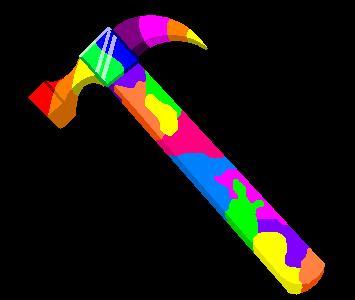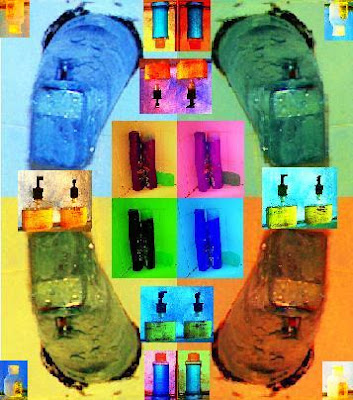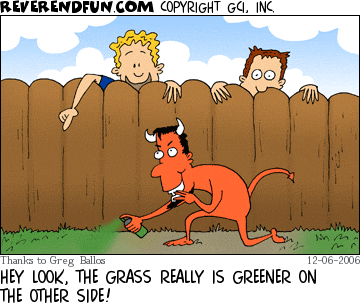 (this picture is brought to you by the failure, Thomas Edison)
(this picture is brought to you by the failure, Thomas Edison)
To put Ian's last saying another way, failure is like a brick—you can yell at it all you want for tripping you, but there’s nothing that says it can’t become a part of your road. In fact, more often then not, it’s the bricks of failure that actually get you somewhere—if their value is realized, that is. It reminds me of a story—a story about munchkins. It takes place in the Land of Oz, quite some time after Dorothy and her friends freed them from the wicked enchantment of that witch. As to be expected, the munchkins in Munchkinland have a whole life of their own apart from what you might have seen in the movie or read in the book. In fact, one of the favorite activities of the munchkins is racing. Racing is what brings them together as a community, partially because it’s a shared activity, and partially because it acts as an important fund-raiser for the poverty-ridden Munchkinland. Being the place where Dorothy’s house landed brought in some tourists for awhile, but it soon wore off and they had to find other means of raising money. So, they decided to use an activity they all loved—racing. And I don’t mean car racing, either. Munchkins don’t have cars. No, they race on foot. After all, they’ve got that lovely yellow brick road to run on.
Granted, racing never brought in as many tourists as Dorothy’s legacy did, but it helped some. But the town was still hurting financially, and the Wizard of Oz had threatened to evict them from Munchkinland if they didn’t pay their zoning taxes. Thus, they held races three times every year to bring in money. And racing was all they had thought of so far.
Now you might think that, since munchkins are short and all, they’d be fairly poor at running, jogging, sprinting, or anything of that sort. On the contrary, munchkins are some of the fastest creatures in Oz. Because they’re so small, they rigorously train their legs to take them as fast as possible. Hence, racing is a big deal in Munchkin land. And what’s amazing is, the shorter they come, the faster they are. Take Deeps, for example. He’s the smallest munchkin in town—the runt of his family. But as soon as he was born (weighing 0.2 ounces), his family knew he’d be a great runner someday. Deeps won the Triannual Oz-Munchkinland Yellow-Brick-Road Odorf and Oblib Marathon every time it was held (the event is also known as the TOMYBROOM—Odorf and Oblib were two highly esteemed ancestors who, with an important family ring, ran the longest relay race ever, spanning over two generations and across their entire continent) (sorry, I have a thing for long parentheses today).
Deeps’ cousin, Wolston, normally came in second place. He was the second shortest munchkin in the land. Even Popillol, the president of a local candy fraternity (which threw a welcome party for Dorothy once, I believe), was one of the fastest runners. But that was more because of how much candy he’d eaten over the years and how it made it easy for him to trip and roll down hills mid-race. Whatever the case, every munchkin in the village was an avid racer, one way or another.
Every munchkin, that is, except one.
His name is Kirbton, Popillol’s son. He’s about 5 feet tall. That’s not too tall, you might think, but for a munchkin it makes life a bit difficult. Especially in matters of racing. Kirbton is about 1/3rd legs. If it weren’t for his abnormally long legs, in fact, Kirbton probably would be about average height—for a munchkin, that is. But since he has such tall legs, Kirbton isn’t a very good racer at all. Some munchkins even think he’s not a very good munchkin, being so tall. He normally keeps to himself, and when the Triannual Oz-Munchki—er, the TOMYBROOM—comes around every four months, Kirbton hides in the clock tower in the center of town (which is a bit of a squeeze for him, since it’s only 6 feet tall itself).
However, on the 14th Tri—um, TOMYBROOM—event, Kirbton found himself being pulled along by the cheerful but rolly-polly Popillol to the starting line.
“I knew I’d find you this time, Kirbton,” chuckled his father, “Quit your squirming and get ready to race.”
“But I’m no good at it, Pop! Everytime I’ve tried to run, I trip and fall. I’m all legs!”
“Oh, hush yourself, Kirby. Every munchkin can race. Don’t be afraid to try something you’ve never done before. Just do it! What’s the worst that can happen?”
Popillol waddled away to take his place in the mass of poised munchkins. “I could trip and fall,” Kirbton answered. It was one thing for his father to trip and fall—he had a form that allowed him to maintain his momentum. But Kirbton was like a bundle of sticks. “Sticks don’t roll,” he thought, “they just . . . stick.”
Kirbton knew he’d be the laughingstock of the village. Nobody ever said much to his face about his height and his legs, but he knew people talked about him. And he knew they’d have a lot more to talk about after the race was over.
But, wishing to please his bubbly father, he awkwardly poised like the rest of the racers and awaited the starting whistle.
“On your mark,” called the Mayor,
“Get set!”
“GO!” and the blaring whistle was lost in the sound of the quick scamper of racing munchkin feet along the yellow-brick track.
And amazingly, Kirbton was in the midst of them! “I’m actually doing it!” he thought, “I’m actually running a race.”
But no sooner had he rounded the blind curve in the road than he snagged one of his skinny toes on one of the bricks and fell nose first against the hard yellow track. The rest of the munchkins continued on their way, pretending to ignore Kirbton in his fallen state. Some even accidentally stepped on his outstretched legs as they came around the curve, but they too went on as if nothing had been in their way. Soon, the last of the munchkins jogged by, including the mayor (who always brought up the rear out of ceremonial responsibility). Kirbton was all alone, face first against the yellow brick road. Still sprawled, he began to cry. His tears fell inches away from his face as he said to the ground, “I’m a failure! I don’t even fit! I don’t belong in this race or in this town or even in Oz! I’m a stinking failure!”
And with that, he slowly picked himself up to head for his home, where he planned on packing up his things and leaving Oz forever.
But as he pushed himself off the ground, he noticed his tears on the road. The sunlight shione on them in such a way that they glistened. It made Kirbton pause. “My tears are the best thing I’ve ever done for this town. Even though they’re small, the way they glisten is one of the prettiest things I’ve seen. But no one else will see them. They’ll be gone by the time…”
Kirbton didn’t finish his sentence. He had lifted himself a bit more and noticed that it wasn’t the tears glistening. It was the brick beneath them, its texture magnified by the salty droplets. Kirbton stooped over again and looked closely at the brick. He ran his finger over the smooth, yellow surface and looked at it. Small, yellow sparkles glittered on his fingertip. He did the same with another brick. More sparkles. And it was then that Kirbton made a remarkable discovery—the same discovery Toto had made (but had never told):
“The yellow brick road isn’t yellow,” he said to himself, “it’s gold!”
At the finish line, all of the munchkins (except one) congratulated each other on a job well done. As always, Deeps had won, and Wolston had come in second. In the midst of the celebration, Popillol began searching for his son. No one paid any attention when Popillol asked, “has anyone seen my son?” He asked that every time they got to the finish line. But no sooner had he asked then he looked down the road towards the start and saw a lanky figure running, holding something high in the air, and shouting.
“There he is!” yelled Popillol, “Look at him go!”
Kirbton sped up the road and to the finish line. “Gold!” he screamed, “It’s gold!” The crowd turned, curious about what he was screaming.
“I know it’s gold,” said Deeps, motioning to the medal around his neck, “that’s what winners are awarded. But you wouldn’t know that, would you, Kirbs?”
Kirbton didn’t even listen. “No, no, no,” he said, panting. He pointed at the brick in his hand, “It’s not brick…it’s,” he wheezed, “. . . it’s,” he wheezed again. Then, short of breath and faint from stopping so quickly, Kirbton passed out. As he fell, Popillol caught the brick from his hand and finished Kirbton’s sentence:
“Gold!”
Kirbton awoke a few moments later to the cheers of the town. The financial crisis of the town was solved, all because of Kirbton’s discovery. Granted, the road would have to be redone, but there was rumor that Emerald City had ordered too many green bricks for building the downtown houses of the Scarecrow, the Lion, and the Tinman.
As the crowd chanted Kirbton’s name, Popillol knelt beside him and showed him the brick. “How did you discover this?” he asked.
Kirbton smiled, “I fell,” he said. “If I hadn’t fallen, I never would have known the streets were made of gold.”
The End.
Okay, so, all that added up:
1 unnecessary parentheses.
1 picture of
21 hearts (give-or-take a few).
2 magnetic poems.
16 lines of “Dance.”
34 lines of “How High Up”
1 picture of “Latherynse” with
28 bath items and
4 faucets.
4 Ephpy-quotes.
1 picture of failure.
1 munchkin story.
Altogether, let’s see…all the small numbers (1, 2, 1, 4, 4, 1, 1, & 1) is…15. And…16 + 34 is…50…add the previous 15…that’s 65. 28 bath items and 21 hearts is…49.
Uh-oh.
I went over. 49 and 65 is…114. Oops.
I caught up too much.
Oh well. C is also the Roman-numeral for 100. That’ll work. I’ll just toss 114 in the Landfill for Obscure and Imaginary Numbers….


 These next two are of my manger scene. It came with wise men, but I had to get 2 Jawas and a Tatooine bartender to stand in for the shepherds. Behind those gathered around the manger, you'll see the Lamplighter, and the angelic Harmony, guarding in silent purity.
These next two are of my manger scene. It came with wise men, but I had to get 2 Jawas and a Tatooine bartender to stand in for the shepherds. Behind those gathered around the manger, you'll see the Lamplighter, and the angelic Harmony, guarding in silent purity.
 These following pictures are just some random things I wanted to throw in. Their titles are listed below.
These following pictures are just some random things I wanted to throw in. Their titles are listed below.


































 Next, here’s
Next, here’s  I’ve gotten behind on quotes, too, so here’s
I’ve gotten behind on quotes, too, so here’s 


